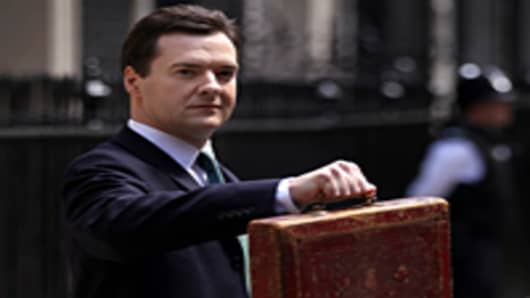The International Monetary Fund (IMF) has cut its growth forecast for the UK economy to 1.5 percent for 2011, but has said it continues to support the coalition government’s spending cuts.
The IMF report stated: “strong fiscal consolidation is underway and remains essential to achieve a more sustainable budgetary position, thus reducing fiscal risks.”
It added while growth would be no higher than 1.5 percent in 2011 it would rise to 2.5 percent in the medium term.
The downgrade to the UK’s economic growth forecast is the second this year. At the start of the year the IMF forecast UK economic growth of 2 percent for 2011, which it then revised down to 1.75 percent in April.
The Fund acknowledged growth had been flat over the last two quarters, as consumer confidence was “impaired by spiking commodity prices, a soft housing market, and headwinds from necessary fiscal consolidation.”
It said the latter two factors and the ongoing process of household and bank balance sheet repair would continue to weigh on growth.
But the IMF said the recovery should be buoyed by private investment, which is rebounding from unsustainably low levels and was supported by low interest rates and corporations holding strong cash positions.
Meanwhile, the Fund said net trade was improving in step with the global recovery and may benefit further if labor productivity - which had been depressed in part due to relatively high labor hoarding in the UK - rebounds and improves competitiveness.
The latest IMF report suggested that if growth resumed as expected in the coming quarters, the case for monetary tightening would increase. However, it added that the pace of monetary tightening should be gradual, given the extended period of fiscal contraction and the high sensitivity of house prices to short-term interest rates.
The IMF said inflation was also likely to remain above 4 percent for the rest of the year but that it would gradually fall back to its target level of 2 percent by the end of 2012.
The IMF report comes a day after a group of 50 economists called on the UK governmentto ease the pace of spending cuts, arguing the economy was too fragile to cope with the pace and severity of the government’s austerity measures.
At a news conference, John Lipsky, deputy managing director of the IMF said, "uncertainty around the central forecasts remains high", as it did in many other economies.
He added that the “unemployment rate remains unacceptably high but it seems to be stabilising".
He also warned it was important to remember that government spending had only been reduced by a fraction of what it had been the year before.
”First of all let’s make sure we get a few facts clear. The level for public spending as a percentage of GDP has been reduced by 0.5 percent compared to the last fiscal year. However it remains well above the pre-crisis level of spending, so I think it’s important to maintain that perspective, Lipsky said.
“Fiscal consolidation does create some headwinds to growth but also creates some positive factors such as lower interest rates and in terms of bolstering the economy and fiscal sustainability,” he added.
The IMF added there were significant risks to inflation, growth and unemployment", which may need a policy response from the government echoing the Chancellor of the Exchequer’s own comments earlier on Monday that the government’s policy was flexible, thought to be the first time he has made such a suggestion in relation to the government’s policy on spending cuts.
George Osborne told BBC Radio 4’s Today programme: “There is flexibility built into the plan that I announced a year ago... We’re talking about the structural deficit, so in other words we allow the automatic stabilisers to operate, which means that the economy can move up and down with the cycle, the government spending can move up and down with the cycle.”
“This debate is quite binary... There’s an assumption that either you don’t do any cutting at all, or there’s my plan. My plan actually, I think, provides flexibility, but also stability and confidence. It’s flexible because it was very specifically designed to be cyclical,” he added.


